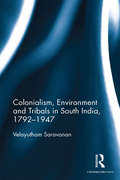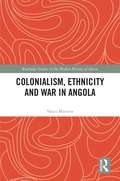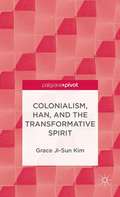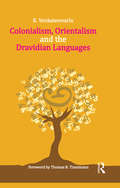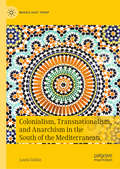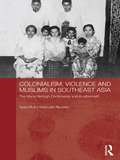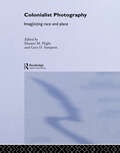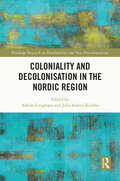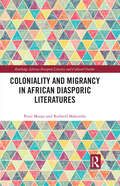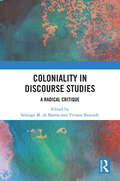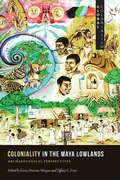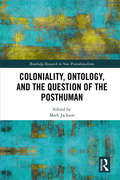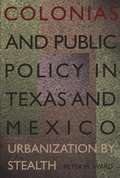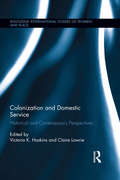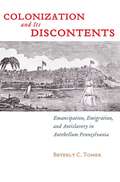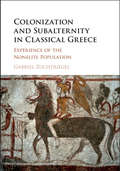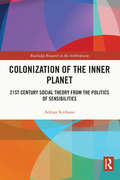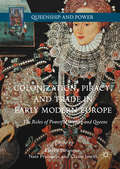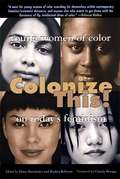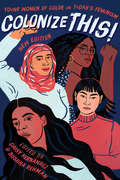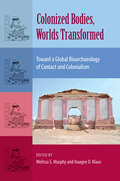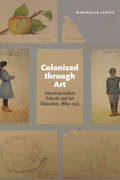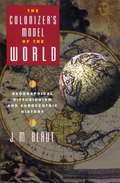- Table View
- List View
Colonialism, Environment and Tribals in South India,1792-1947
by Velayutham SaravananThis book offers a bird’s eye view of the economic and environmental history of the Indian peninsula during colonial era. It analyses the nature of colonial land revenue policy, commercialisation of forest resources, consequences of coffee plantations, intrusion into tribal private forests and tribal-controlled geographical regions, and disintegration of their socio-cultural, political, administrative and judicial systems during the British Raj. It explores the economic history of the region through regional and ‘non-market’ economies and addresses the issues concerning local communities. Comprehensive, systematic and rich in archival material, this book will be useful to scholars and researchers in history, especially those concerned with economic and environmental history.
Colonialism, Ethnicity and War in Angola (Routledge Studies in the Modern History of Africa)
by Vasco MartinsMaking a fresh contribution to our understanding of the history of Angola, this book explores the impact of social, political and economic change upon the largest ethnic group of the country, the Ovimbundu. Based on extensive fieldwork conducted in Angola, including oral testimonies and life stories, participant-observation, and archival materials, this book shifts the viewpoint from the colonial enterprise, international politics and ideological alignments to focus on African experiences and responses. The author analyses the transformations introduced by Christianity and colonialisation and how they contributed to politicised modern notions of ethnic identity, creating communal imaginaries that began manifesting during Angolan’s anti-colonial war. He then explains how the weaving of this ethno-political landscape assisted UNITA’s mobilisation of significant parts of the Ovimbundu during the civil-war, essentially deepening popular belief in the axiom Ovimbundu-UNITA, and how the latter created a national imaginary that echoed social anxieties and moral discourses. The book then explores the links between ethnicity, politics and war on the quality of post-war citizenship in Angola, particularly on people’s integration in the citizenry or marginalisation from it. Articulating a reading of ethnicity that connects high politics and elite based explanations with how ordinary people feel and discuss ethnicity, politics and citizenship, this book will be of interest to scholars of African history and politics, as well as ethnicity and nationalism.
Colonialism, Han, and the Transformative Spirit
by Grace Ji-Sun KimGlobalism, colonialism, and consumerism have caused unjust suffering (han), for the earth's exploited peoples and the exploited lands. To reverse this tragedy, we need to work for a safer, sustainable planet and renew our inspiration from God as the transforming Spirit who gives, sustains and empowers life to all.
Colonialism, Orientalism and the Dravidian Languages
by K. VenkateswarluThe Dravidian language family is marked historically by a protracted struggle between Tamil and its aggressively assertive supremacy, and the consequent peripheralizing of other majoritarian languages of the region. This book looks at the development of Telugu — with its unique grammatical and lexical tradition as instrumental in the construction of the concept of the Dravidian language family in 1816, and in the development of comparative linguistics since that time. The author’s arguments locate Telugu in multiple matrices: of historical and theoretical Orientalism; the colonial state’s interest in native languages; the politics of state patronage; questions of cultural assimilation and divergence; the overbearing presence of Tamil and its literary traditions; and the related inter- and intra-civilizational dialogues. The book thus grapples with the tortured emergence of Telugu — a product of the dynamics of Andhra society, economy, polity and culture influenced and driven by Muslim, Hindu and Western influence. With its richly textured narrative, this book will be of interest to those in the fields of history, sociology, socio-linguistics, colonial studies, and literature, apart from the generally interested reader.
Colonialism, Transnationalism, and Anarchism in the South of the Mediterranean (Middle East Today)
by Laura GaliánThis book explores the unsettling ties between colonialism, transnationalism, and anarchism. Anarchism as prefigurative politics has influenced several generations of activists and has expressed the most profound libertarian desire of Southern Mediterranean societies. The emergence of anarchist and anti-authoritarian movements and collective actions from Morocco to Palestine, Algeria, Tunis, Egypt, Lebanon, Syria and Jordan has changed the focus of our attention in the last decade. How have these anarchist movements been formulated? What characteristics do they share with other libertarian experiences? Why are there hardly any studies on anarchism in the South of the Mediterranean? In turn, the book critically reviews the anti-authoritarian geographies in the South of the Mediterranean and reassesses the postcolonial status of these emancipatory projects. Colonialism, Transnationalism, and Anarchism in the South of the Mediterranean invites us to revisit the necessity of decolonizing anarchism, which is enunciated, in many cases, from a privileged epistemic position reproducing neocolonial power relations.
Colonialism, Violence and Muslims in Southeast Asia: The Maria Hertogh Controversy and its Aftermath (Routledge Studies in the Modern History of Asia #56)
by Syed Muhd AljuniedThis book deals with the genesis, outbreak and far-reaching effects of a legal controversy and the resulting outbreak of mass violence, which determined the course of British colonial rule after post World War Two in Singapore and Malaya. Based on extensive archival sources, it examines the custody hearing of Maria Hertogh, a case which exposed tensions between Malay and Singaporean Muslims and British colonial society. Investigating the wide-ranging effects and crises faced in the aftermath of the riots, the analysis focuses in particular on the restoration of peace and rebuilding of society. The author provides a nuanced and sophisticated understanding of British management of riots and mass violence in Southeast Asia. By exploring the responses by non-British communities in Singapore, Malaya and the wider Muslim world to the Maria Hertogh controversy, he shows that British strategies and policies can be better understood through the themes of resistance and collaboration. Furthermore, the book argues that British enactment of laws pertaining to the management of religions in the post-war period had dispossessed religious minorities of their perceived religious rights. As a result, outbreaks of mass violence and continual grievances ensued in the final years of British colonial rule in Southeast Asia - and these tensions still pertain in the present. This book will be of interest to scholars and students of law and society, history, Imperial History and Asian Studies, and to anyone studying minorities, and violence and recovery.
Colonialist Photography: Imag(in)ing Race and Place
by Eleanor M. Hight Gary D. SampsonColonialist Photography is an absorbing collection of essays and photographs exploring the relationship between photography and European and American colonialism. The book is packed with well over a hundred captivating images, ranging from the first experiments with photography as a documentary medium up to the decolonization of many regions after World War II. Reinforcing a broad range of Western assumptions and prejudices, Eleanor M. Hight and Gary D. Sampson argue that such images often assisted in the construction of a colonial culture.
Coloniality and Decolonization in the Nordic Region (Routledge Research on Decoloniality and New Postcolonialisms)
by Julia Suárez-Krabbe Adrián GroglopoThis book advances critical discussions about what coloniality, decoloniality, and decolonisation mean and imply in the Nordic region. It brings together analysis of complex realities from the perspectives of the Nordic peoples, a region that is often overlooked in current research, and explores the processes of decolonisation that are taking place in this region. The book offers a variety of perspectives that engage with issues such as Islamic feminism and the progressive left; racialisation and agency among Muslim youths; indigenising distance language education for Sami; extractivism and resistance among the Sami; the Nordic international development endeavour through education; Swedish TV reporting on Venezuela; creolizing subjectivities across Roma and non-Roma worlds and hierarchies; and the whitewashing and sanitisation of decoloniality in the Nordic region. As such, this book extends much of the productive dialogue that has recently occurred internationally in decolonial thinking but also in the areas of critical race theory, whiteness studies, and postcolonial studies to concrete and critical problems in the Nordic region. This should make the book of considerable interest to scholars of history of ideas, anthropology, sociology, cultural studies, postcolonial studies, international development studies, legal sociology, and (intercultural) philosophy with an interest in coloniality and decolonial social change.
Coloniality and Migrancy in African Diasporic Literatures (Routledge African Diaspora Literary and Cultural Studies)
by Peter Moopi Rodwell MakombeThis book explores literary representations of African immigrant experiences in Western countries, against the backdrop of colonial stereotypes and recent expressions of anti-immigrant sentiment in Europe and America. The book deploys the concept of coloniality of migrancy to explore how global coloniality continues to shape the identities and lived experiences of African immigrants as represented in African diasporic literatures. It considers the persistence of racist and discriminatory attitudes and patterns of thought that developed during slavery and colonialism, and asks to what extent it is possible for African immigrants to transcend race in their configuration of their identity. Five key twenty-first century African diasporic novels are considered in the analysis: Imbolo Mbue’s Behold the Dreamers, Dave Eggers’ What is the What: The Autobiography of Valentino Achak Deng, Chimamanda Ngozi Adichie’s Americanah, NoViolet Bulawayo’s We Need New Names and Helon Habila’s Travellers. Overall, the book demonstrates that despite the hostility migrants of colour encounter, Africans are shunning the victimhood of colonialism and slavery and finding alternative ways of navigating and inhabiting the modern world. Foregrounding the usefulness of decoloniality and postcolonial theory as theoretical tools, this book will be an invaluable resource to researchers across the fields of African literature, migration, sociology, politics, and decolonial studies.
Coloniality in Discourse Studies: A Radical Critique
by Solange M. de Barros Viviane ResendeThe volume examines the discourse-based critique of coloniality. It brings together an extensive interdisciplinary dialogue which reveal what different research fields – such as sociology of language, social psychology, history, and political science, among others – have to say about discourse criticism and de/coloniality. In doing so, it also invites a critique of critical thinking, acknowledging the relevance of dissonant voices that arise from this debate. The essays in this volume discuss possibilities to decolonize discursive studies without losing sight of its contradictions. The book delves into how one can, as an intellectual who enjoys the privileges of coloniality in academic environments of the Global North, deal with the limitations and paradox of a radical critique through discourse. It discusses how ideas, entrenched in privilege, can be extracted, shared, and applied while ensuring the radicality of their local contextualization. These ideas then must not only make sense within themselves but also resonate with other contexts, readings, and peoples, in the South, without repeating the mistakes of hermetic scholarly lexicons. A key reading on decoloniality, critical thinking, methodologies, ideas, ideologies, language, and critical discourse analysis, this volume will be of immense interest to scholar and researchers of language and literature, political science, the social sciences, and Global South Studies.
Coloniality in Discourse Studies: A Radical Critique
by Solange M. de Barros Viviane ResendeThe volume examines the discourse-based critique of coloniality. It brings together an extensive interdisciplinary dialogue that reveals what different research fields – such as sociology of language, social psychology, history and political science, among others – have to say about discourse criticism and de/coloniality. In doing so, it also invites a critique of critical thinking, acknowledging the relevance of dissonant voices that arise from this debate.The essays in this volume discuss possibilities to decolonize discursive studies without losing sight of its contradictions. The book delves into how one can, as an intellectual who enjoys the privileges of coloniality in academic environments of the Global North, deal with the limitations and paradox of a radical critique through discourse. It discusses how ideas, entrenched in privilege, can be extracted, shared and applied while ensuring the radicality of their local contextualization. These ideas then must not only make sense within themselves but also resonate with other contexts, readings and peoples, in the South, without repeating the mistakes of hermetic scholarly lexicons.A key reading on decoloniality, critical thinking, methodologies, ideas, ideologies, language and critical discourse analysis, this volume will be of immense interest to scholar and researchers of language and literature, political science, the social sciences and Global South Studies.
Coloniality in the Maya Lowlands: Archaeological Perspectives (Global Colonialism)
by Tiffany C. Fryer Kasey Diserens MorganColoniality in the Maya Lowlands explores what has been required of the Maya to survive both internal and external threats and other destabilizing forces. These include shifting power dynamics and sociocultural transformations, tumultuous political regimes, the precarity of newly formed nation states, migration in search of refuge, and newly globalizing economies in the Yucatecan lowlands in the Late Colonial to Early National periods—the times when formal Spanish colonial rule was giving way to Yucatecan and Mexican neocolonial settler systems. The work takes a hemispheric approach to the historical and material analysis of colonialism, bridging the often disparate literatures on coloniality and settler colonialism. Archaeologists and anthropologists working in what are today southeastern Mexico, Belize, Guatemala, and Honduras grapple with the material realities of coloniality at a regional level. They provide sustained discussions of Maya experiences with wide-ranging colonial endurances: violence, resource insecurity, land rights, refugees, the control of borders, the movement of contraband, surveillance, individual and collective agency, consumption, and use of historic resources. Considering a future for historical archaeologies of the Maya region that bridges anthropology, ethnohistory, Indigenous studies, settler colonial studies, and Latin American studies, Coloniality in the Maya Lowlands presents a new understanding of how ways of being in the Maya world have formed and changed over time, as well as the shared investments of historical archaeologists and sociocultural anthropologists working in the Maya region. Contributors: Fernando Armstrong-Fumero, Alejandra Badillo Sánchez, Adolfo Iván Batún Alpuche, A. Brooke Bonorden, Maia C. Dedrick, Scott L. Fedick, Fior García Lara, John Gust, Brett A. Houk, Rosemary A. Joyce, Gertrude B. Kilgore, Jennifer P. Mathews, Patricia A. McAnany, James W. Meierhoff, Fabián A. Olán de la Cruz, Julie K. Wesp
Coloniality, Ontology, and the Question of the Posthuman (Routledge Research in New Postcolonialisms)
by Mark JacksonThis book brings together emerging insights from across the humanities and social sciences to highlight how postcolonial studies are being transformed by increasingly influential and radical approaches to nature, matter, subjectivity, human agency, and politics. These include decolonial studies, political ontology, political ecology, indigeneity, and posthumanisms. The book examines how postcolonial perspectives demand of posthumanisms and their often ontological discourses that they reflexively situate their own challenges within the many long histories of decolonised practice. Just as postcolonial research needs to critically engage with radical transitions suggested by the ontological turn and its related posthumanist developments, so too do posthumanisms need to decolonise their conceptual and analytic lenses. The chapters' interdisciplinary analyses are developed through global, critical, and empirical cases that include: city spaces and urbanisms in the Global North and South; food politics and colonial land use; cultural and cosmic representation in film, theatre, and poetry; nation building; the Anthropocene; materiality; the void; pluriversality; and, indigenous world views. Theoretically and conceptually rich, the book proposes new trajectories through which postcolonial and posthuman scholarships can learn from one another and so critically advance.
Colonias and Public Policy in Texas and Mexico: Urbanization by Stealth
by Peter M. WardToday in Texas, over 1500 colonias in the counties along the Mexican border are home to some 400,000 people. Often lacking basic services, such as electricity, water and sewerage, fire protection, policing, schools, and health care, these "irregular" subdivisions offer the only low-cost housing available to the mostly Hispanic working poor. This book presents the results of a major study of colonias in three transborder metropolitan areas and uncovers the reasons why colonias are spreading so rapidly. Peter Ward compares Texas colonias with their Mexican counterparts, many of which have developed into fully integrated working-class urban communities. He describes how Mexican governments have worked with colonia residents to make physical improvements and upgrade services-a model that Texas policymakers can learn from, Ward asserts. Finally, he concludes with a hard-hitting checklist of public policy initiatives that need to be considered as colonia housing policy enters its second decade in Texas.
Colonization and Domestic Service: Historical and Contemporary Perspectives (Routledge International Studies of Women and Place #14)
by Claire Lowrie Victoria K. HaskinsThis groundbreaking book brings together two key themes that have not been addressed together previously in any sustained way: domestic service and colonization. Colonization offers a rich and exciting new paradigm for analyzing the phenomenon of domestic labor by non-family workers, paid and otherwise. Colonization is used here in its broadest sense, to refer to the expropriation and exploitation of land and resources by one group over another, and encompassing imperial/extraction and settler modes of colonization, internal colonization, and present-day neo-colonialism. Contributors from diverse fields and disciplines share new and stimulating insights on the various connections between domestic employment and the processes of colonization, both past and present, in a range of original essays dealing with Indonesian, Canadian Aboriginal, Australian Aboriginal, Pacific Islander, African, Jamaican, Indian, Chinese, Anglo-Indian, Sri Lankan, and 'white' domestic servants.
Colonization and Its Discontents: Emancipation, Emigration, and Antislavery in Antebellum Pennsylvania (Early American Places #3)
by Beverly TomekPennsylvania contained the largest concentration of early America’s abolitionist leaders and organizations, making it a necessary and illustrative stage from which to understand how national conversations about the place of free blacks in early America originated and evolved, and, importantly, the role that colonization—supporting the emigration of free and emancipated blacks to Africa—played in national and international antislavery movements. Beverly C. Tomek’s meticulous exploration of the archives of the American Colonization Society, Pennsylvania’s abolitionist societies, and colonizationist leaders (both black and white) enables her to boldly and innovatively demonstrate that, in Philadelphia at least, the American Colonization Society often worked closely with other antislavery groups to further the goals of the abolitionist movement.In Colonization and Its Discontents, Tomek brings a much-needed examination of the complexity of the colonization movement by describing in depth the difference between those who supported colonization for political and social reasons and those who supported it for religious and humanitarian reasons. Finally, she puts the black perspective on emigration into the broader picture instead of treating black nationalism as an isolated phenomenon and examines its role in influencing the black abolitionist agenda.
Colonization and Subalternity in Classical Greece: Experience of the Nonelite Population
by Gabriel ZuchtriegelIn this book, Gabriel Zuchtriegel explores and reconstructs the unwritten history of Classical Greece - the experience of nonelite colonial populations. Using postcolonial critical methods to analyze Greek settlements and their hinterlands of the fifth and fourth centuries BC, he reconstructs the social and economic structures in which exploitation, violence, and subjugation were implicit. He mines literary sources and inscriptions, as well as archaeological and data from excavations and field surveys, much of it published here for the first time, that offer new insights into the lives and status of nonelite populations in Greek colonies. Zuchtriegel demonstrates that Greece's colonial experience has far-reaching implications beyond the study of archaeology and ancient history. As reflected in foundational texts such as Plato's 'Laws' and Aristotle's 'Politics', the ideology that sustained Greek colonialism is still felt in many Western societies.
Colonization and the Origins of Humanitarian Governance
by Alan Lester Fae DussartHow did those responsible for creating Britain's nineteenth-century settler empire render colonization compatible with humanitarianism? Avoiding a cynical or celebratory response, this book takes seriously the humane disposition of colonial officials, examining the relationship between humanitarian governance and empire. The story of 'humane' colonial governance connects projects of emancipation, amelioration, conciliation, protection and development in sites ranging from British Honduras through Van Diemen's Land and New South Wales, New Zealand and Canada to India. It is seen in the lives of governors like George Arthur and George Grey, whose careers saw the violent and destructive colonization of indigenous peoples at the hands of British emigrants. The story challenges the exclusion of officials' humanitarian sensibilities from colonial history and places the settler colonies within the larger historical context of Western humanitarianism.
Colonization of the Inner Planet: 21st Century Social Theory from the Politics of Sensibilities (Routledge Research in the Anthropocene)
by Adrian ScribanoThis book explores the conquest, predation and management of human bodies and emotions by the growing capitalist digital community. It seeks to understand the debate between various forms of the individual, subject, actor, and agent to emerge a social theory vision for the 21st century. The book moves beyond the colonization of the physical world to examine the process of colonization of humans. It focuses on the communication humans have with the world to understand how this impacts their sensibilities. This communication is influenced by technological innovations that enable a process of systematic colonization of human beings as bodies/emotions. This book explores a social theory which will allow us to understand this redefinition of the individual. This enables us to uncover connections between the colonization of the ‘inner planet’ that is the human society, and the dialectic of the person and the politics of their sensibilities. This is explored through the tensions that arise between the forms a person assumes in unequal and diverse cultural contexts and the emotions behind those cultural differences. The book will appeal to academics and postgraduate students of sociology, philosophy and anthropology, as well as psychologists, organizational specialists, linguists, ethnographers, historians, political scientists, administrators and professionals affiliated with NGOs.
Colonization, Piracy, and Trade in Early Modern Europe: The Roles of Powerful Women and Queens (Queenship and Power)
by Estelle Paranque Nate Probasco Claire JowittThis collection brings together essays examining the international influence of queens, other female rulers, and their representatives from 1450 through 1700, an era of expanding colonial activity and sea trade. As Europe rose in prominence geopolitically, a number of important women--such as Queen Elizabeth I of England, Catherine de Medici, Caterina Cornaro of Cyprus, and Isabel Clara Eugenia of Austria--exerted influence over foreign affairs. Traditionally male-dominated spheres such as trade, colonization, warfare, and espionage were, sometimes for the first time, under the control of powerful women. This interdisciplinary volume examines how they navigated these activities, and how they are represented in literature. By highlighting the links between female power and foreign affairs, Colonization, Piracy, and Trade in Early Modern Europe contributes to a fuller understanding of early modern queenship.
Colonize This!: Young Women of Color on Today's Feminism
by Cherríe Moraga Daisy Hernández Bushra RehmanIt has been decades since women of color first turned feminism upside down, exposing the '70s feminist movement as exclusive, white, and unaware of the concerns and issues of women of color from around the globe. Now a new generation of brilliant, outspoken women of color is speaking to the concerns of a new feminism, and to their place in it. Daisy Hernandez of Ms. magazine and poet Bushra Rehman have collected a diverse, lively group of emerging writers who speak to their experience--to the strength and rigidity of community and religion, to borders and divisions, both internal and external--and address issues that take feminism into the twenty-first century. One writer describes herself as a "mixed brown girl, Sri-Lankan and New England mill-town white trash," and clearly delineates the organizing differences between whites and women of color: "We do not kick ass the way the white girls do, in meetings of NOW or riot grrl. For us, it's all about family. " A Korean-American woman struggles to create her own identity in a traditional community: "Yam-ja-neh means nice, sweet, compliant. I've heard it used many times by my parents' friends who don't know shit about me. " An Arab-American feminist deconstructs the "quaint vision" of Middle-Eastern women with which most Americans feel comfortable. This impressive array of first-person accounts adds a much-needed fresh dimension to the ongoing dialogue between race and gender, and gives voice to the women who are creating and shaping the feminism of the future.
Colonize This!: Young Women of Color on Today's Feminism (Live Girls)
by Daisy Hernandez Bushra RehmanNewly revised and updated, this landmark anthology offers gripping portraits of American life as seen through the eyes of young women of color <p><p> It has been decades since women of color first turned feminism upside down, exposing the feminist movement as exclusive, white, and unaware of the concerns and issues of women of color from around the globe. Since then, key social movements have risen, including Black Lives Matter, transgender rights, and the activism of young undocumented students. Social media has also changed how feminism reaches young women of color, generating connections in all corners of the country. And yet we remain a country divided by race and gender. <p> Now, a new generation of outspoken women of color offer a much-needed fresh dimension to the shape of feminism of the future. In Colonize This!, Daisy Hernandez and Bushra Rehman have collected a diverse, lively group of emerging writers who speak to the strength of community and the influence of color, to borders and divisions, and to the critical issues that need to be addressed to finally reach an era of racial freedom. <p> With prescient and intimate writing, Colonize This! will reach the hearts and minds of readers who care about the experience of being a woman of color, and about establishing a culture that fosters freedom and agency for women of all races.
Colonized Bodies, Worlds Transformed: Toward A Global Bioarchaeology of Contact and Colonialism (Bioarchaeological Interpretations of the Human Past: Local, Regional, and Global)
by Melissa S. Murphy and Haagen D. Klaus"Breaks new ground regarding how to think about colonial encounters in innovative ways that pay attention to a wide range of issues from health and demography to identity formations and adaptation."—Debra L. Martin, coeditor of The Bioarchaeology of Violence "Amply demonstrates the breadth and variability of the impact of colonialism."—Ken Nystrom, State University of New York at New Paltz European expansion into the New World fundamentally altered Indigenous populations. The collision between East and West led to the most recent human adaptive transition that spread around the world. Paradoxically, these are some of the least scientifically understood processes of the human past. Representing a new generation of contact and colonialism studies, this volume expands on the traditional focus on the health of conquered peoples by considering how extraordinary biological and cultural transformations were incorporated into the human body and reflected in behavior, identity, and adaptation.By examining changes in diet, mortuary practices, and diseases, these globally diverse case studies demonstrate that the effects of conquest reach further than was ever thought before—to both the colonized and the colonizers. People on all sides of colonial contact became entangled in cultural and biological transformations of social identities, foodways, social structures, and gene pools at points of contact and beyond. Contributors to this volume illustrate previously unknown and variable effects of colonialism by analyzing skeletal remains and burial patterns from never-before-studied regions in the Americas to the Middle East, Africa, and Europe. The result is the first step toward a new synthesis of archaeology and bioarchaeology.Contributors: Rosabella Alvarez-Calderón | Elliot H. Blair | Maria Fernanda Boza | Michele R. Buzon | Romina Casali | Mark N. Cohen | Danielle N. Cook | Marie Elaine Danforth | J. Lynn Funkhouser | Catherine Gaither | Pamela García Laborde| Ricardo A. Guichón | Rocio Guichón Fernández | Heather Guzik | Amanda R. Harvey | Barbara T. Hester | Dale L. Hutchinson | Kristina Killgrove | Haagen D. Klaus | Clark Spencer Larsen | Alan G. Morris | Melissa S. Murphy | Alejandra Ortiz | Megan A. Perry | Emily S. Renschler | Isabelle Ribot | Melisa A. Salerno | Matthew C. Sanger | Paul W. Sciulli | Stuart Tyson Smith | Christopher M. Stojanowski | David Hurst Thomas | Victor D. Thompson | Vera Tiesler | Jason Toohey | Lauren A. Winkler | Pilar Zabala
Colonized through Art: American Indian Schools and Art Education, 1889-1915
by Marinella LentisColonized through Art explores how the federal government used art education for American Indian children as an instrument for the “colonization of consciousness,” hoping to instill the values and ideals of Western society while simultaneously maintaining a political, social, economic, and racial hierarchy. Focusing on the Albuquerque Indian School in New Mexico, the Sherman Institute in Riverside, California, and the world’s fairs and local community exhibitions, Marinella Lentis examines how the U.S. government’s solution to the “Indian problem” at the end of the nineteenth century emphasized education and assimilation. Educational theories at the time viewed art as the foundation of morality and as a way to promote virtues and personal improvement. These theories made the subject of art a natural tool for policy makers and educators to use in achieving their assimilationist goals of turning student “savages” into civilized men and women. Despite such educational regimes for students, however, indigenous ideas about art oftentimes emerged “from below,” particularly from well-known art teachers such as Arizona Swayney and Angel DeCora.Colonized through Art explores how American Indian schools taught children to abandon their cultural heritage and produce artificially “native” crafts that were exhibited at local and international fairs. The purchase of these crafts by the general public turned students’ work into commodities and schools into factories.
Colonizer's Model of the World
by J. M. BlautThis book challenges one of the most pervasive and powerful beliefs of our time concerning world history and world geography. This is the doctrine of European diffusionism, the belief that the rise of Europe to modernity and world dominance is due to some unique European quality of race, environment, culture, mind, or spirit, and that progress for the rest of the world results from the diffusion of European civilization. J.M. Blaut persuasively argues that this doctrine is not grounded in the facts of history and geography, but in the ideology of colonialism. It is the world model which Europeans constructed to explain, justify, and assist their colonial expansion. The book first defines the Eurocentric diffusionist model of the world as one that invents a permanent world core, an "Inside," in which cultural evolution is natural and continuous, and a permanent periphery, and "Outside," in which cultural evolution is mainly an effect of the diffusion of ideas, commodities, settlers, and political control from the core. The ethnohistory of the doctrine is traced from its 16th-century origins, through its efflorescence in the period of classical colonialism, to its present form in theories of economic development, modernization, and new world order. Blaut demonstrates that most "Western" scholarship is to some extent diffusionist and based implicitly in the idea that the world has one permanent center from which culture-changing ideas tend to emanate. Eurocentric diffusionism has shaped our attitudes concerning race and the environment, psychology and society, technology and politics.
